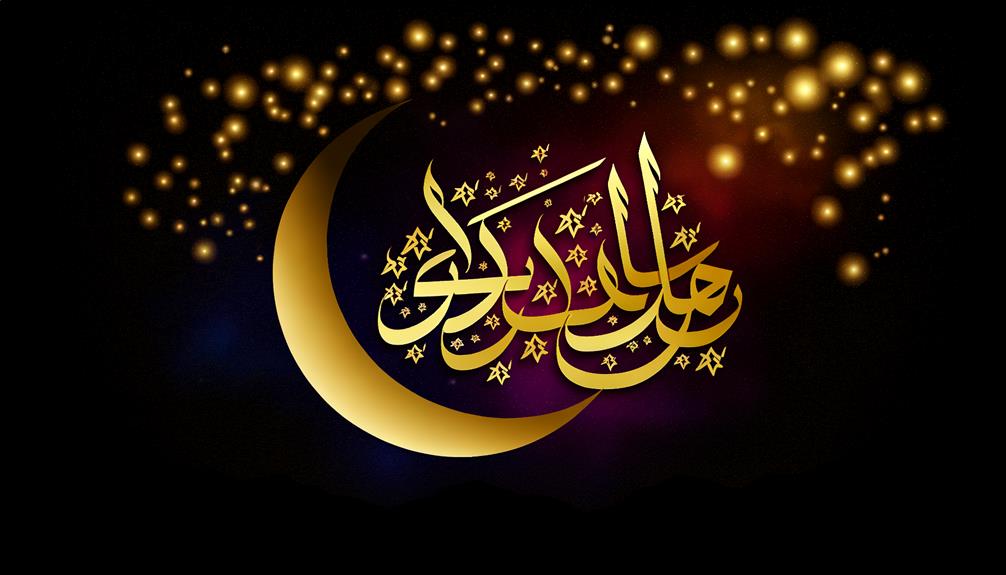Muhammad Name Meaning in Arabic
The name Muhammad is deeply rooted in Arabic culture and history. Stemming from the Arabic root 'H-M-D', it translates to 'praised one' or 'worthy of praise'.
Gaining prominence with the spread of Islam in the 7th century, it reflects the life and teachings of the Prophet Muhammad, symbolizing piety and humility. Parents bestow the name to honor the Prophet and aspire for their children to uphold his qualities.
Globally, it's a popular choice due to the influence of Islamic culture. If you explore further, you'll discover even more about its linguistic origins, cultural significance, and enduring global impact.

Key Takeaways
- 'Muhammad' is an Arabic name originating from the root 'H-M-D', meaning 'praised' or 'worthy of praise'.
- It is a passive participle from the verb 'hammada', translating to 'he praised' or 'the one who's praised'.
- The name is associated with religious devotion and cultural identity in Arabic society.
- In Islamic religion, it symbolizes the life and teachings of the Prophet Muhammad.
- Its worldwide popularity reflects the global influence of Islam and Arabic culture.
Origin and Historical Background
Have you ever wondered about the historical origins of the name Muhammad, one of the most popular names in the Arabic-speaking world? It's likely you've come across it often, given its prevalence.
Originally, the name Muhammad wasn't merely a name, but a title, carrying profound religious significance. Stemming from the Arabic root 'H-M-D', it means 'praised one' or 'one who's worthy of praise'.
Historically, the name gained prominence with the advent of Islam in the 7th century, as Prophet Muhammad was the founder of this faith. Since then, it's been passed down through generations, serving as a token of reverence and spiritual connection for Muslims worldwide.
Understanding its origin provides a deeper appreciation of its cultural and religious significance.
Linguistic Analysis of Muhammad
Diving into the linguistic analysis of the name 'Muhammad', you'll uncover layers of meaning that further underscore its cultural and religious significance. Muhammad, originating from the Arabic root word 'hamd', means 'praised' or 'praiseworthy'.
This root word 'hamd' is used in numerous Arabic words, creating a rich tapestry of interconnected meanings. The exact form of 'Muhammad' is a passive participle from the second form of the Arabic verb 'hammada', signifying 'he praised'.
The 'mu-' prefix indicates the passive voice, leading 'Muhammad' can be literally translated as 'the one who's praised'. The name's inherent positivity and reverence encapsulate Arabic linguistic conventions and reflect Arabic's richness and depth, underpinning its vast literary and cultural influence.
Cultural Significance in Arabic Society
In Arabic society, the name 'Muhammad' carries more than just its linguistic significance; it serves as an emblem of religious devotion and cultural identity. Being the most common name in the world, it's not only a mark of reverence but also a reflection of the pervasive influence of Arabic culture. This widespread adoption is a testament to the deep-seated respect for the Prophet Muhammad, whose life and teachings continue to shape the spiritual and moral framework of millions. For many, choosing this name for their children symbolizes a profound connection to their faith and heritage. The muslim name meaning in arabic for Muhammad is ‘the praised one,’ underscoring qualities of gratitude and virtue that resonate deeply within Islamic traditions.
Many parents name their sons 'Muhammad' to honor the prophet Muhammad, showing a deep-seated tradition of respect and admiration. This practice is also a confirmation of the enduring cultural impact of Islamic history on Arabic society.
The name, thus, isn't just a personal identifier, but a symbol of collective cultural heritage and religious ethos. It's a constant reminder of the Arabic society's roots, shaping its identity and values in a profound way.
Muhammad in Islamic Religion
Drawing upon the teachings of Islam, you'll find that the name 'Muhammad' holds a significant religious connotation, symbolizing the life and teachings of the Prophet Muhammad, the founder of this global religion. As a figure of reverence and respect, he's considered the last messenger of God, exemplifying piety, humility, and moral rectitude.
His life serves as a model, with his name acting as a reminder of his virtues and teachings. Therefore, to name someone 'Muhammad' isn't merely a cultural practice, but also a spiritual aspiration, hoping for the bearer to embody the Prophet's qualities. It's a reflection of the profound impact of the Prophet Muhammad on Islamic religion, showcasing his enduring legacy in the hearts of believers.
Worldwide Popularity of the Name
Have you ever wondered why 'Muhammad' ranks among the most popular names worldwide? Its widespread use isn't random, but rather a reflection of the global influence of Islam, a religion with over 1.8 billion followers.
The name 'Muhammad' carries significant religious and cultural weight, being the name of the Prophet Muhammad, the founder of Islam. It's not just widely used in predominantly Muslim countries, but also in regions with significant Muslim populations.
This popularity is fueled by a deep-rooted respect for the Prophet and the desire to bestow upon children the virtues associated with his name. In this way, the name 'Muhammad' has transcended mere personal identification, becoming a symbol of faith and devotion to billions worldwide.
Variations and Nicknames
Moving forward, let's scrutinize the myriad of nicknames and variations that derive from the name Muhammad.
You'll find that these adaptations are widespread, each carrying its own unique cultural nuances and significance.
It's an insightful journey into how one name can echo across different languages and societies, transforming and adapting while maintaining its core identity.
Popular Muhammad Nicknames
In exploring the rich historical and cultural tapestry of the Arabic name Muhammad, you'll encounter a plethora of popular nicknames and variations, each carrying unique nuances and significance. These sobriquets reflect reverence, affection, and a deep connection to the name's inherent meaning – 'praiseworthy'.
- Moe/Mo: A common, affectionate abbreviation used globally.
- Ahmad: An alternate form meaning 'more commendable', embodying the essence of Muhammad's character.
- Mustafa: Another popular nickname meaning 'chosen one', symbolizing Muhammad's prophetic role in Islam.
These nicknames aren't just mere abbreviations or variations, they're imbued with cultural, historical, and emotional significance. They encapsulate the respect and veneration accorded to the name Muhammad and its holders throughout the Islamic world.
Notable Variations Worldwide
Often, you'll find the name Muhammad transformed and adapted to various linguistic and cultural contexts worldwide, each variant preserving its historical and traditional essence while reflecting local nuances.
For instance, in Turkey, it's commonly known as Mehmet, while in Iran, it's Mohammad. The Bosnians use Muhamed, and the Maltese use Mimmo. In the African continent, it's often used as Mamadou or Momo.
These adaptations aren't random but rather a reflection of phonetic and grammatical structures of each language. They also illustrate the pervasive influence of Arabic culture and Islam, given this name's intrinsic association with the Prophet Muhammad.
Hence, you can discern the global impact of the name Muhammad just by observing its various adaptations.
Personalities Named Muhammad
Delving into the spectrum of notable figures, you'll find that the name Muhammad has been borne by numerous influential personalities across various fields. This name, steeped in history and tradition, carries with it a certain prestige and respect.
- Muhammad Ali: A name synonymous with strength and resilience, Ali was a world-renowned boxer and humanitarian. His name stirs emotions of admiration and respect.
- Muhammad Iqbal: A philosopher, poet, and politician, Iqbal was an inspiration to many, evoking feelings of patriotism and intellectual curiosity.
- Muhammad Yunus: A Nobel laureate and social entrepreneur, Yunus's name is associated with compassion and innovative thinking.
Each individual named Muhammad has shaped their field in unique ways, fostering a profound connection between their achievements and the powerful meaning of their shared name.
Conclusion
So, you've explored the core of 'Muhammad', a name steeped in history and rich in significance. Its Arabic origins paint a picture of praise-worthiness, and its cultural and religious impact is undeniable.
From its global popularity to its different monikers, the name Muhammad carries a strong narrative. Indeed, many individuals carrying this name have influenced the world.
Essentially, the name Muhammad is more than a label; it's a declaration of praise and respect.






